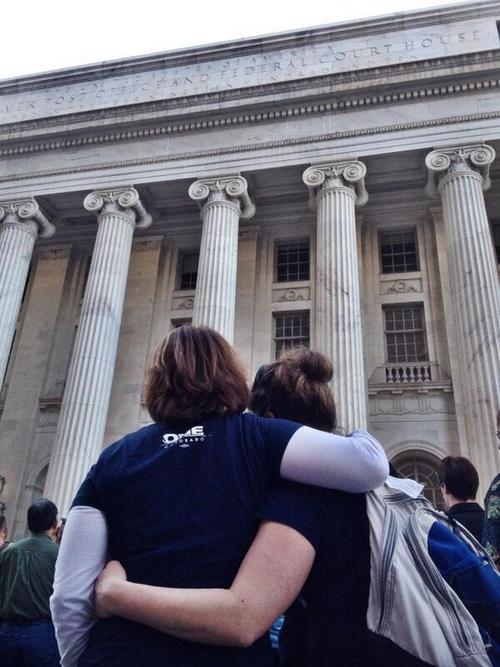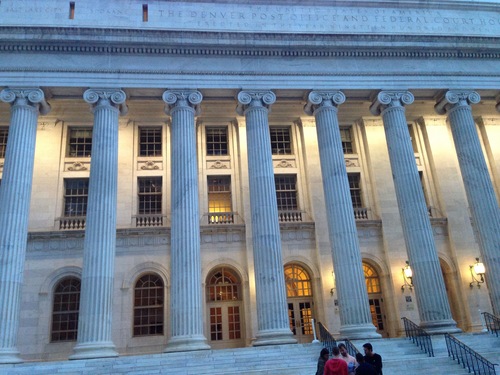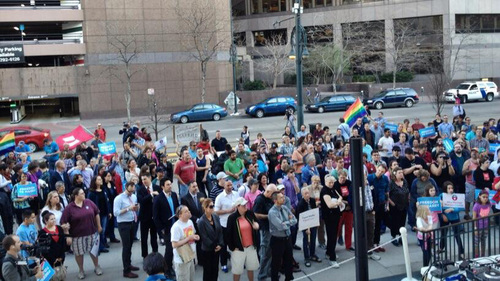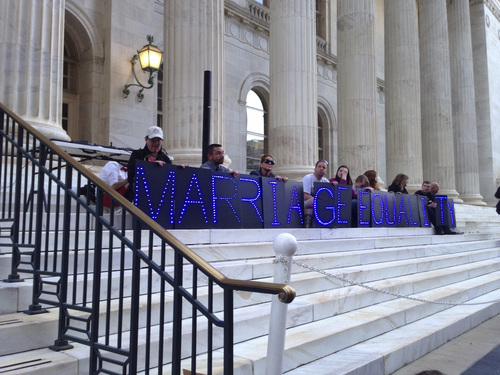This is an archived article that was published on sltrib.com in 2014, and information in the article may be outdated. It is provided only for personal research purposes and may not be reprinted.
For the second time in a week, a state tried to persuade three federal appeals court judges that it has the authority to define marriage as an institution that can only exist between a man and a woman.
For the second time in a week, it is unclear whether the state succeeded.
After nearly an hour of argument Thursday afternoon before the 10th Circuit Court of Appeals, the case from Oklahoma was left in the hands of three judges — Jerome A. Holmes, Paul J. Kelly Jr. and Carlos F. Lucero — who a week earlier seemed starkly split on the same issue of same-sex marriage in Utah.
The court seemed similarly divided this time, with Kelly apparently on the side of the state and Lucero leaning toward upholding the lower courts' decisions that toppled state bans on same-sex marriage.
But there was a noticeable shift in the severity of the questions Holmes lobbed at Oklahoma and the language he used in comparing anti-gay marriage laws to anti-interracial marriage laws overturned in the 1967 U.S. Supreme Court case Loving v. Virginia.
"The line being drawn here, arguably, is entirely predicated on sex, on gender," Holmes said. "The state cannot define marriage in any way it wants and trample constitutional rights. Right?"
Widely considered the "vote to get," Holmes is expected to cast the deciding vote in both cases.
"At this point, it really is about Holmes," said Carl Tobias, judicial appointment expert and professor at the University of Richmond School of Law. "I'm tempted to say he may be leaning one way and the case[s] may turn on that."
As they did in their questioning of Utah's lead counsel Gene C. Schaerr and attorney Peggy A. Tomsic, who represents the three plaintiff couples from the Beehive State, the judges Thursday focused their inquiries on issues of equality, child welfare, legal review standards and state's rights.
To James Campbell, the attorney representing Oklahoma, Holmes posed six questions and Lucero asked three. Kelly remained silent.
To Don Holladay, who represents two lesbian couples who sued to overturn Oklahoma's ban on same-sex marriages, Kelly asked nine questions, Holmes again asked six and Lucero posed three.
"I think Kelly and Lucero were pretty much where they were the last time," Tobias said, comparing Oklahoma's hearing to Utah's, which happened in the same courtroom exactly one week before.
Both cases challenge the same kind of law and pose essentially the same constitutional question.
In both, judges from lower courts ruled that the U.S. Supreme Court found there is a fundamental right to marriage in its ruling on U.S. v. Windsor, which overturned the crux of the federal Defense of Marriage Act.
"If there is a fundamental right to marriage, what more needs to be described?" Lucero asked.
Utah and Oklahoma insist the Windsor decision leaves the question of defining marriage to states.
"The Windsor court expressly extolled the virtues of allowing the formation of consensus when the people decide the definition of marriage," Campbell argued. "The purpose of marriage in Oklahoma is to channel naturally procreative relationships into committed unions, in order to provide stability to the types of relationships that are capable of producing unintended children, and are capable of providing children with both biological parents."
Utah's argument last week — that children suffer from "fatherlessness" — was similar in nature.
While ideal in theory, Lurcero said Thursday, children often do not have the benefit of a two-parent household by the man and woman who conceived them even in opposite-sex relationships.
"Why is that interest, the gay couple interest, in any way going to affect the heterosexual couples that want to get married?" Lucero asked. "I mean, I don't understand the nexus that you're making, that if gay marriage is allowed that somehow that's going to be a poison bill to marriage by heterosexual couples. I don't understand it."
In responding, Campbell echoed a concern Schaerr raised in his argument last week: that there is no definitive proof children raised in the care of same-sex parents will not be harmed or disadvantaged by such an arrangement.
"No one knows for sure what the long-term affects of redefining marriage will be," Campbell said. "But people on both sides of the marriage debate acknowledge that it will have real-world consequences."
Part of the reason this particular issue, of child welfare, is so hotly debated is there is sociological research that supports both sides.
Last week, mere hours before Utah's appeal, the state backed away from the research of Mark Regnerus of the University of Texas, which Utah used in its briefs to bolster the claim that opposite-sex parenting is the "gold standard" for children.
Although Oklahoma did not cite Regnerus by name in court, the judges seemed to take issue with its reference to similar sociological work.
"There is no foundation for the belief that there would be a different outcome or an inferior outcome by virtue of stable gay relationships," Holmes said. "In other words, [The American Sociological Association] emphasized the two key components in determining good outcomes for children were stability and family resources, parental resources, and both of those have nothing to do with gender, right?"
"That is the position of that professional association," Campbell said. "But it is not without dispute."
It is unclear when the judges may rule in the two cases, though they have both been put on an expedited calendar.
The court has the option of issuing two separate rulings — one for each state — or combining them into one joint decision.
Several experts told The Tribune they expect two distinct decisions addressing the unique circumstances of each state, though the constitutional analysis in each will likely be highly similar, if not identical.
Among the chief differences between the two states is the fact that some 1,300 same-sex couples in Utah were allowed to marry after U.S. District Judge Robert J. Shelby's historic Dec. 20 ruling and before the U.S. Supreme Court granted the state a stay that halted the weddings 17 days later.
If the 10th Circuit Court of Appeals rules in favor of the plaintiffs in both cases, that would effectively outlaw bans on same-sex marriages in Utah, Oklahoma, Colorado, New Mexico, Wyoming and Kansas.
But, either way, it is likely the judges will stay their decision — preventing any immediate changes to take hold — until the U.S. Supreme Court addresses this issue.
Twitter: @Marissa_Jae









